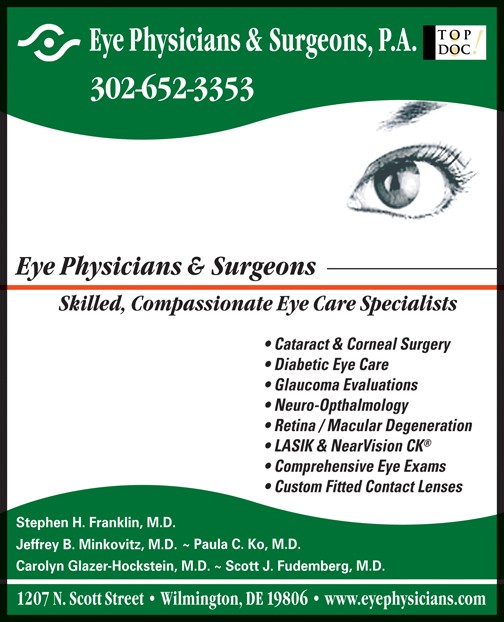Considering Cataract Surgery In Delaware?

Important Questions To Ask
By Jeffrey B. Minkovitz, M.D.
A cataract is a clouding of the natural lens in the eye, part of the normal aging process. Typical symptoms include blurry vision, glare, and loss of color and contrast. Causes include aging, smoking, diabetes, UV light, and certain medications. The only definitive treatment is removal and replacement with an intraocular lens, though changing spectacles may help early cataracts. Once a patient becomes symptomatic, there are several important questions to ask when considering surgery,
IS SURGERY NECESSARY?
The existence of a cataract does not always require surgery. Only the affected individual can decide when vision loss warrants surgery. With modern cataract surgery, not only is restoring vision possible, but oftentimes vision is improved to levels better than before the cataract. The surgeon can help determine whether vision loss is due to cataract, or to another condition (such as macular degeneration or glaucoma). Certain conditions require prompt treatment to avoid irreversible damage, and therefore a thorough, timely evaluation is important. Fortunately, cataracts usually require surgery only when vision loss interferes with activities: when patients can no longer perform necessary or enjoyable tasks. Occasionally, surgery may be “necessary” because vision loss makes certain activities dangerous, such as driving a car.
WHICH SURGEON?
Important factors to consider are the surgeon’s training, experience and continuing education. Is she or he board certified and fellowship trained? Also, it is important to have available the latest advances in surgical techniques and options. The surgeon should be the one to examine and make the determination of which procedure is best, and then to have a thoughtful and thorough conversation with the patient explaining indications, options, and “informed consent.”
OPTONS FOR SURGERY:
Once surgery has been elected, the next decision is the type of lens implant. Aspheric lenses may give sharper vision, but they are not suitable for everyone. Advanced Technology intraocular lenses, which can further help reduce the need for glasses, include Toric lenses, which correct astigmatism, and multifocal and accommodating lenses, which may enable patients to see far away as well as near. Each has unique advantages and disadvantages. A surgeon experienced in each can help patients decide which is most appropriate. Finally, laser assisted cataract surgery is now available, and offers a greater level of precision and further options to correct astigmatism. Surgical technique is critical, and experience in refractive surgery (including laser vision correction) is beneficial. Only after careful consultation (including a thorough examination and a thoughtful discussion) with an experienced surgeon should surgery be elected.
WHERE TO HAVE SURGERY
Cataract surgery is now most often performed in ambulatory surgery centers. Ideally, these are specialized, sterile facilities licensed by the state and accredited by recognized organizations such as The Joint Commission or the Accreditation Association for Ambulatory Health Care (AAAHC).
Having anesthesiology available, whether or not sedation is needed, provides a safer environment. Anesthesia is typically topical (no needles), with IV sedation available to make the experience pleasant and comfortable
Under the right circumstances, the results of modern cataract surgery are brilliant.
Testimonials
Best surgeon ever! Dr. Jeffrey has the greatest staff, from the receptionist to the surgical nurses. Wonderful results. ~ Judge R.
Dr. Minkovitz is a wonderful doctor, and I love his staff who are friendly and always helpful in explaining things so I can understand. ~ PJS
Jeffrey Minkovitz, MD is an ophthalmologist with Eye Physicians and Surgeons in Wilmington, Delaware. Dr. Minkovitz specializes in cataract and refractive surgery, and is one of only a few Delaware surgeons specially trained in corneal transplantation. He completed a cornea and refractive surgery fellowship at the renowned Wilmer Eye Institute of Johns Hopkins. Previously, he graduated magna cum-laude from Harvard, earned his medical degree from the University of Massachusetts, completed internship at Harvard’s Mt. Auburn Hospital, and served his ophthalmology residency at Washington University.
Dr. Minkovitz participated in the early research on Excimer Laser refractive surgery, and has offered this procedure to Delawareans since FDA approval in 1996, before Delaware had its own laser. These early pioneering individuals travelled to Wilmer Institute with Dr. Minkovitz, where he maintained his teaching and clinical appointment. In addition to introducing laser vision correction to Delaware, he also introduced NearVision CK to eliminate reading glasses, DSAEK (a newer, less invasive type of corneal transplant) and most recently the newest advance: laser cataract surgery.
Dr. Minkovitz is a co-founder of the Center for Advanced Surgical Arts and serves on its medical advisory board. He is also on active staff at Christiana Care. While on staff of Wilmer at Johns Hopkins University, Dr. Minkovitz received the Outstanding Teacher award. He was also named Top Doc in ophthalmology by Delaware Today Magazine six consecutive years, and has been an invited instructor at American Academy of Ophthalmology Annual Meetings.
Visit us on facebook or at www.eyephysicians.com
For further information or to schedule an appointment please call 302-656-2020 extension 1.
CK® Testimonial…
It finally occurred to me what has been missing during the last 2 days. Since Richard’s surgery, he isn’t complaining about his inability to read something on the fly without searching for his glasses. He wired 6 recessed lights (NO GLASSES), he read the Sunday paper sections A & B and menus (NO GLASSES), and is using the computer (NO GLASSES). I suppose for Richard, needing to look for glasses when he wanted to see something, has been the hardest adjustment of becoming older. His dependence was so gradual that I never related to why he would get so angry over needing them. My house has been quieter. I now have 2 less things to do everyday: find the glasses and make sure they were clean!


